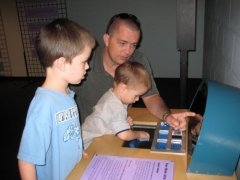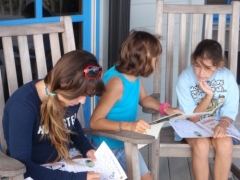I have been thinking about how I need to continue to let go of the desire for the appearance of perfection in my life. While I have no desire to spend the time (or money) it takes to put on a perfect image, when my house, or my face, or my body doesn't look the way I wish it would, it makes me a bit blue.
I want to honor people who come to my house by having it look lovely, the reality is, it's not always picked up.

(Hmmmm, nice, but sort of sad that it doesn't look, "lived in")
I want people to take me seriously and respect my thoughts, but I am also working on dealing with the fact that I don't always look put together or that my skin isn't always clear. For example, while watching the "What's New in 2012" videos, a blemish on my cheek jumps out at me, it's just laughing at me that I had a breakout the day I was going in for filming...keeps me humble I guess.*
Also on the topic of image, after this, my third pregnancy, the weight just isn't coming off, and searching for something to wear every day is a challenge. I can't wait for garage sale season to arrive so I can expand my wardrobe with clothes that fit me now.
I guess I could lock the door, hide my face, and never leave the house so no one sees my ill fitting clothes. Instead, I am working on welcoming people into my home, helping them feel at peace so they don't notice the items they have to step over. I'm working on smiling and asking about what others are going through so they see my heart instead of any mark on my face. And, I try to make a point to look at my children so people see the joy I wear in this season, instead of the clothes I have on.
So, if you see my blemish, or imagine tripping over my stuff, or wonder what I've got on... realize, I'm working on letting it all go.

(The normal state of Natalia's room)
Until next time,
Jonelle
*I have never felt comfortable in make-up so I don't wear it. I'm not opposed to it on others, I just personally feel like I'm wearing a mask and don't recognize myself when I look in the mirror. So, I deal with those blemishes and try to pretend that anyone looking at me is more interested in what I'm saying than what my face looks like.











